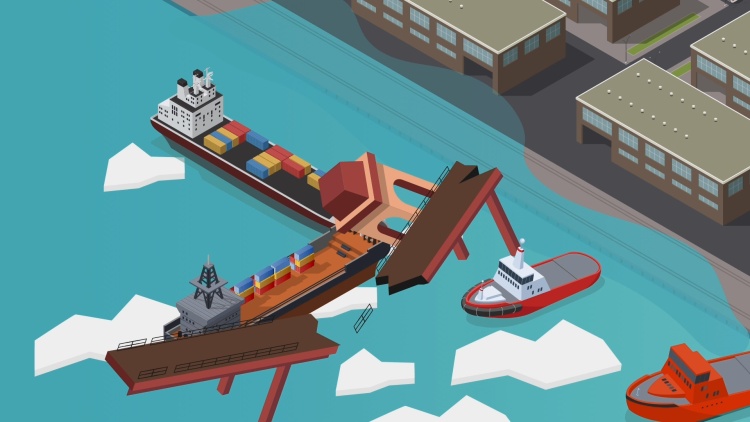Kinsman Transit Co. [No. 2]
United States Court of Appeals for the Second Circuit
388 F.2d 821 (1968)
- Written by Meagan Anglin, JD
Facts
One evening, the moorings on a ship called the MacGilvray Shiras broke, causing the ship to travel down a narrow river channel. The moorings broke as a result of the negligence of the Kinsman Transit Company and the Continental Grain Company (respondents). As the MacGilvray Shiras traveled through the channel, it collided with another ship, the Michael K. Tewksbury. This collision caused the Michael K. Tewksbury to break loose from its moorings and travel downstream. Both ships crashed into the Michigan Avenue Bridge, creating a dam and disrupting river transportation for approximately two months. Several claimants came forward seeking damages as a result of the delay in river transportation. One claimant, Cargill, had hundreds of thousands of bushels of wheat stored on a ship that could not be moved due to the collision. Thus, Cargill was unable to carry out contractual obligations to deliver the wheat. As a result, Cargill had to secure replacement wheat. Another claimant, Cargo Carriers, was unloading corn from a ship at the time of the collision. The collision did not damage the cargo of Cargo Carriers, but it did make unloading the cargo impossible, so the company had to rent new equipment to unload the corn. Cargo Carriers and Cargill (petitioners) brought claims to recover damages incurred as a result of the collision. A commissioner was appointed to determine the damages of the claimants, but the trial judge refused to confirm the damage awards made by the commissioner. Cargo Carriers and Cargill appealed this decision.
Rule of Law
Issue
Holding and Reasoning (Kaufman, J.)
What to do next…
Here's why 907,000 law students have relied on our case briefs:
- Written by law professors and practitioners, not other law students. 47,100 briefs, keyed to 996 casebooks. Top-notch customer support.
- The right amount of information, includes the facts, issues, rule of law, holding and reasoning, and any concurrences and dissents.
- Access in your classes, works on your mobile and tablet. Massive library of related video lessons and high quality multiple-choice questions.
- Easy to use, uniform format for every case brief. Written in plain English, not in legalese. Our briefs summarize and simplify; they don’t just repeat the court’s language.







